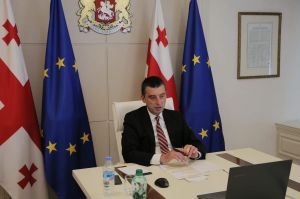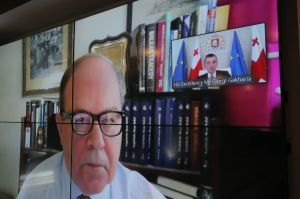|
Giorgi Gakharia Talks About Georgia's Role in Black Sea Region, Occupation, and Regional Security Challenges at Discussion Organized by Leading British Think Tank RUSI
2020-10-14
 
Georgia's role in the wider Black Sea region, the country's Euro-Atlantic aspirations, the occupation of its territories, security challenges in the region, and hybrid threats were the main topics of the Georgian Prime Minister's speech at the thematic discussion organized by the Royal United Services Institute for Defence and Security Studies (RUSI), one of the oldest and most authoritative think tanks in the world in the field of defense and security. Giorgi Gakharia participated in the discussion together with the organization's foremost analysts.
The head of the government started the discussion by talking about the challenges facing Georgia and the difficult situation in the occupied regions. Giorgi Gakharia noted that 20 percent of the country - Abkhazia and the Tskhinvali Region - is under occupation and facing numerous security-related challenges.
"This is our everyday life. Georgia's democratic and economic development was under constant pressure from Russia for the last decades. Even now, in the time of the global pandemic, the problem is that we are facing the ongoing borderization process on the occupation line. Of course, the situation regarding the occupation is grave. Russia constantly violates the [Cease Fire] Agreement of 2008. And, of course, we have 500,000 IDPs and refugees in the country that still cannot return to their homes," the Prime Minister stated.
According to the head of the government, hybrid threats also pose a serious challenge to Georgia.
"Today, we are facing the disinformation campaign each and every day and this is the most important part of hybrid domain at this moment in the country. You know that Georgia's management in the fight against COVID has been recognized as successful. But, at the same time, we are facing, for example, the cyber-attack from the side of Russia directly targeting the healthcare system of the country, first of all, the Lugar Lab, which was the most important part of our fight against COVID. The recent challenge we faced was the large-scale cyber-attack of 28 October in 2019, which targeted a number of websites of Georgian public and private sectors. When it comes to cyber [security], we of course understand that [the support of our allies is very important in this regard]," Giorgi Gakharia stated.
In his speech, the Prime Minister also focused on the potential of the Black Sea, which is a very important aspect in terms of the country's security and Euro-Atlantic aspirations.
"Georgia has to rediscover the Black Sea [in terms of] its foreign policy and security. When we are talking about the Black Sea we see the opportunity for Georgia to figure out a new role, serving as a reliable partner, a security partner for Europe and the United States, as well as NATO. When we are talking about the Black Sea, we see our new role in three main dimensions, such as political, economic, and, of course, security. We have a pretty good legal framework and pretty good political relations with the European Union. I mean, first of all, very important tools such as the DCFTA, the Association Agreement, and the visa free regime but at the same time we understand that unfortunately Georgia does not have a land border with the EU. This is the real challenge. When we are talking about the Black Sea, we mean that we have to physically connect Georgia to the EU. This will be a win-win project for everyone. When it comes to security and our role in Black Sea security - this is a new opportunity for cooperation with NATO and our strategic allies. That is why for us, everything connected with the Black Sea is so, so important," the Prime Minister stated.
As regards transport communications, according to Giorgi Gakharia, Georgia has the ambition to become a regional platform for expanded transport communication, which will connect Europe and the East. According to him, several dimensions are considered in transport communication - economy, trade, transportation, etc. Therefore, the Black Sea is a window of opportunity for Georgia.
In his speech, the head of the government also spoke about Georgia's Euro-Atlantic aspirations and noted that this course has the support of more than 80 percent of the population.
"European and Euro-Atlantic [integration] is the key priority for Georgia's foreign policy agenda and this is the historic choice of our nation. At the same time, this is the process of democratization of the society. And when we are talking about Euro-Atlantic integration, of course, the first dimension is European integration. And yes, we have at this moment the practical tools - the Association Agreement, the DCFTA, and the visa liberalization process but for us, it is time to take the next step. Now, we are starting to discuss with the European Union the new agenda - not only for Eastern Partnership, which was very successful for us, but we think that for associated countries there should be new tools to enhance the cooperation with the European Union. An additional, another dimension of Euro-Atlantic integration of the country, of course, is [NATO] membership. Yes, the NATO-Georgia cooperation has been very dynamic for the last several years. We fully realize that there is no political readiness at this moment but, at the same time, we are committed to continue this because this is a country which is ready to continue structural reforms, with the full understanding that we have to reform the country, bringing the country in line with European standards. At the same time, it is well-known that when it comes to NATO, Georgia is practically prepared for membership. But we understand the importance of the process of democratization and in NATO's direction also, we are ready and we are committed to continue the structural reform of the country," Giorgi Gakharia stated.
While speaking about security in the region the Prime Minister viewed the Armenia-Azerbaijan conflict, stressing the vital importance of peace in the Caucasus region.
"This story shows that there is no notion of so-called frozen conflicts - it simply takes one day, one week to unfreeze the conflicts. That is why they are so dangerous. That is why for us, everything that is happening between two of our neighbors at this moment is so risky, not only for Georgia but for the [entire] region. And furthermore, we think that it is very risky for the wider Black Sea region. That is why since the beginning of this escalation, we have temporarily suspended the process of issuing permits for transiting military cargo through our territory because otherwise, we were facing the risk to somehow be involved in this conflict, which is completely unacceptable to Georgia. That was the main reason why we expressed our readiness to facilitate the dialog between the two sides and to host a meeting in Tbilisi. But at the same time we, of course, understand that the support from Western partners is vital in somehow decreasing the tension in the region. Of course, the main role in this should be taken on by the OSCE Minsk Group," Giorgi Gakharia stated.
In his speech, the Prime Minister also viewed the exemplary relations between Georgia and the United Kingdom. He thanked British partners for supporting Georgia's territorial integrity and sovereignty, as well as its Euro-Atlantic aspirations.
The Royal United Services Institute for Defence and Security Studies (RUSI), which operates under the patronage of Queen Elizabeth II of the United Kingdom, is the oldest and one of the most influential research institutes in the world in the field of defense and security. Since 1831, RUSI has been a leading platform for the political leaders of the world. The Institute's Council includes the Duke of Kent, former UK Secretary of State William Hague, former US Central Intelligence Agency director David Petraeus, and former UK Minister for Europe Sir David Lidington.
Press Service of the Government Administration
|

